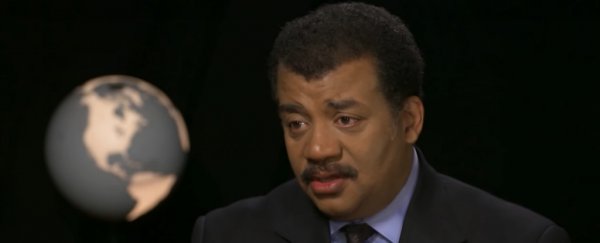It was initially conceived as a joke, but upon further reflection, President Trump has decided that creating a "Space Force" is a really good idea.
"We are going to have the Air Force, and we are going to have the Space Force — separate but equal," President Trump announced at a meeting of the National Space Council in June.
"It is going to be something. So important."
As part of the initiative, President Trump has ordered the Defense Department to establish a sixth branch of the military - one that would be solely focused on space.
"It is not enough to have an American presence in space, we must have American dominance in space," Trump said, adding that he did not want to see China or other countries leading the way.
The president's supporters are so thrilled with the news that they have recently been chanting "Space Force!" at Trump rallies. Although, as The Daily Show recently revealed in a hilarious new segment, not a lot of Trump supporters can successfully articulate what a Space Force actually is.
"It's what they refer to as a cloud computer," one man explained.
The truth is, not everyone is so sure that creating a Space Force is the right move. The Pentagon itself has spurned the idea, with Secretary of Defense James Mattis arguing it would only create "additional organizational layers at a time when we are focused on reducing overhead and integrating joint warfighting efforts."
Retired NASA astronaut Mark Kelly - the identical twin of former astronaut Scott Kelly - has also criticized the initiative for being hopelessly redundant.
"This is a dumb idea. The Air Force does this already. That is their job," Kelly tweeted.
"What's next, we move submarines to the 7th branch and call it the 'under-the-sea force?'"
This is a dumb idea. The Air Force does this already. That is their job. What’s next, we move submarines to the 7th branch and call it the “under-the-sea force?” https://t.co/S1urOuJBe6
— Captain Mark Kelly (@CaptMarkKelly) June 19, 2018
It turns out, however, that there is some historical precedence for Trump's decision. Recently, in an interview with CNN, astrophysicist and science communicator Neil deGrasse Tyson explained why he is ambivalent about the decision.
"I've thought a lot about it, but I don't have a strong opinion," he said.
"The idea of a space force is not fundamentally odd when you consider that the Army, 70 years ago, birthed the Air Force. There was the Army Air Force.
"And once we realized that technology and war-fighting capabilities evolve [and were going to take place up] in the air space rather in the ground space, then it was sensible to suggest that perhaps this should be an entire branch of the military unto itself."
Today, US military presence in space is handled by the Air Force Space Command, and according to physicist Laura Grego at the Union of Concerned Scientists (UCS), this command is tasked with "keeping satellites safe and secure, protecting the space environment, and ensuring that insecurity in space does not threaten security on the ground."
"We as a nation have assets in space of incalculable value. And so when you think about what a military does, as a minimum they would protect a nation's interests and a nation's assets," Tyson further explained.
"So, it's not a weird idea to say we perhaps should have a Space Force."
Still, the famous astrophysicist did not give his unequivocal support to the idea.
"The question is: does the Air Force think that they can't handle it under the current administrative, bureaucratic structures? And if not, then maybe it's a good idea," he told CNN.
"But if the generals say we've got this, then I don't see the need to force it on them."
Regardless of whether the Space Force is necessary or not, some have wondered if the idea violates the United Nations Outer Space Treaty of 1967, which declares space a place for peace and also bans weapons of mass destruction from being stationed or deployed there.
The Treaty does not, however, ban all military operations in space. In fact, the US military has satellites up there right now, and the fear is that China or Russia will soon have the technology to disable these satellites, placing American communications in jeopardy.
Treaty or no treaty, outer space or Earth, Tyson is worried that human nature will inevitably win out in the end.
"There's a part of me that always says: why do we promise that we will treat each other nicely in space? If that's successful why don't we have a peaceful use of Earth Treaty?" he laughed.
"If it works there, it seems to me it should work on Earth. And if we can't get it to work on Earth, why should I have any confidence at all that somehow, 'Oh, now we're in space? Oh, we'll all be friends.'"
"I know I sound cynical saying that, but human nature scares the hell out of me. So, I don't know."
